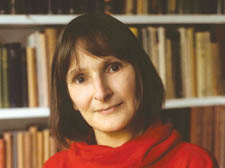|
|
 |
| |
 Eva Figes: polemic takes over from personal memoir Eva Figes: polemic takes over from personal memoir |
Camden Book Review | Eva Figes | Journey to Nowhere | Surviving the Nazis
Eva Figes’ story about surviving the Nazis is honest, moving and very disturbing, writes Ruth Gorb
JOURNEY To Nowhere, says Eva Figes, is a book about good Germans and bad Jews.
In its simplest terms it is about Edith, a plain, awkward Jewish housemaid who during the war was hidden from the Nazis by German neighbours, who at the end of the war went to Israel, felt unwelcome, and came to England.
Figes is a notably powerful writer; the story is therefore very moving and very disturbing – but ultimately it remains unresolved. It will, one is tempted to say, put the cat among the pigeons. “I hope so,” she says. “I am sick of stereotypes.”
Figes’ family was, like so many in the 1930s, deluded: middle-class German-Jews so assimilated that they thought they were safe.
They were not, but they managed to escape from Berlin early in 1939. Edith, their maid, had neither the know-how nor the money to get out. The family settled in London and heard no more about her until nearly 10 years later, when she wrote to them from Palestine and asked if she could have her old job back. Sixteen-year-old Eva was delighted – Edith was part of her early childhood .
There follows a series of extraordinarily touching and revealing scenes.
Eva rushes home from school to sit in the family’s Hendon kitchen with Edith, and bombards her with questions: What was Berlin like after they left? What happened after she went underground? How had she managed to stay alive?
They sit at the table. Edith cleans the silver, shells the peas, and talks, at first reluctantly. She tells Eva hardly believable stories about the German police giving Jews false papers (“not the Gestapo, dummkopf” she says to the incredulous Eva), about hiding in crowded cellars, about sleeping in outhouses, laundry rooms, in a boathouse.
A network of people took her and others like her to new hiding places – “the important thing was to keep on the move”.
Then the war was over. Edith had nowhere to go, and she had no one – she had been brought up in an orphanage. By chance she bumped into a woman who had been in the same orphanage and who persuaded her that only in the Jewish state, “Eretz Israel”, would she be able to make a new beginning.
This proved disastrously wrong. In a kibbutz, where everyone spoke Hebrew, she was ostracised. To the people there she was a German.
Edith was cold-shouldered, says Figes, because “Israelis are never welcoming to newcomers”.
Figes herself has only had unfortunate experiences in Israel. She has been to “male chauvinist” kibbutzim and when she went on an international women’s conference she met hostility, aggression and rudeness.
“We were not treated like honoured guests or respected authors,” she says.
Imagine, then, what it was like for weary survivors like Edith. “Zionists were only interested in human material – young, fit and ready for anything.” In her book she goes further: “Zionists and Nazis had more in common than is generally acknowledged” she writes.
Polemic takes over from personal memoir. Figes’ rage over the situation in the Middle East is expressed in emotive language. She looks at the American involvement in the creation of Israel as a disaster. She sees the Gaza Strip as a concentration camp. She says that Israel’s right to exist is questionable. She looks at the past, and she sees no future for a country where everyone is full of hate.
And where does she belong? Is she British? German? Jewish?
All three, she says. She is British because she is a writer, she writes in English, and language is very important to her. She doesn’t quite belong, she says, but London is home. There is a certain nostalgia about Berlin, so 10 years ago when she was offered a free visit she decided she must open Pandora’s box.
“They pay for your hotel, take you to the opera – you can compare notes with people, ask them how they got out,” she says. ‘And I was able to say to Germans, ‘You killed my grandparents; I’d like to know where and when’.”
Her son, the historian Orlando Figes, helped her find her grandparents in a memorial book. She started crying and couldn’t stop. But it was a turning point.
“I had been so scared,” she says. “But you have to open up. Most survivors shut the door and lock it. But knowing the truth was a beginning for me – a beginning of accepting what happened.”
Does she feel Jewish? She was not brought up with any Jewish education, but she supposes she feels German-Jewish. “What happened in the war is something that always stays with you,” she says.
And what of poor Edith? The telling of her story began not long ago, when Eva Figes was driving along Marylebone Road and saw the red brick frontage of the Samaritan Free Hospital for Women and Children.
It was there, still a teenager, that she had been the only person to visit Edith who was recovering from an operation. Now, a lifetime later, Figes has no idea what happened to Edith.
But she decided her story was worth telling, even if the lack of a proper ending troubles her greatly. “How could I trace her?” she asks. “I didn’t even know her surname.”
Journey to Nowhere.
By Eva Figes. Granta £14.99 |
 |
|
 |
 |
|
 |
|



